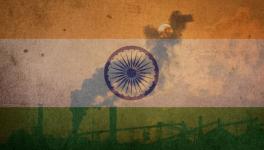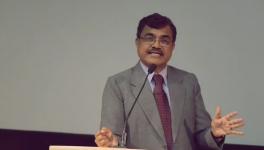Meena Kandasamy: Breaking Class and Caste Divides

Meena Kandasamy said she was in shock when she learned in September that she had won PEN Germany's 2022 Hermann Kesten Prize.
DW contacted her ahead of the prize ceremony, held on November 15, to discuss her journey as a writer. But the motivations behind her work can't be summarized easily, she says: "I don't know where to start."
A look back at her childhood and family background provides some insight into her work.
A lot of Kandasamy's writing is the result of her sensitivity to injustice and the battles against inequity she witnessed as a child.
Her parents, both low-caste Hindus, or "Dalits" from the southern Indian state of Tamil Nadu, got married under the self-respect marriage act. The law, passed in the early 1940s in their state, rejects caste and enables Hindu marriages without the presence of a Brahmin priest, she says.
Her mother, who was a teacher at the Indian Institute of Technology (IIT) in Chennai, one of India's premier schools, became subsequently involved in debates around the Brahmin-led domination at the institution. She initiated several legal proceedings for better employment rights and wages, and for the implementation of prescribed quotas for lower-caste employees and students.
"I grew up in this background and it influenced me enormously," Kandasamy recalls, adding that it was also a political education. "You just don't go to university, do a Master's degree and understand what's happening. You watch it unfold, and as much as I was a child of academics, I realized that the answer to all these problems wouldn't come from the narrow sphere of academia."
Finding comfort in poetry
Poetry turned out to be the genre of choice for the author, who was inspired by the likes of Sylvia Plath. "There was so much that I couldn't process, that I could not just report or write about. So it kind of helped me, you know, having poetry," she explains.
Kandasamy's first anthology of poems, called "TOUCH," was published in 2006, followed by "Ms Militancy" in 2010 and two chapbooks of poems called "#ThisPoemWillProvokeYou and Other Poems" and "We Are Not the Citizens," published in 2015 and 2018 respectively.
The author's poems are iconoclastic, targeting Hindu patriarchy and the representation of holy figures, including the gods Rama and Krishna. Kandasamy also lends a more assertive voice to female goddesses like Sita, who was sent to exile for betraying her husband after Ravana, the king of Lanka, had kidnapped her.
"Poetry is subversive," Kandasamy argues, elaborating that authors before her, including Margaret Atwood, Anne Sexton and Carolyn Duffy have rewritten old stories. "They have this tradition of feminist poets taking on myths and legends and fairy tales and retelling them in a very subversive, feminist way. I thought somebody should do this for Hindu epics and also Tamil epics."
After all, as she points out, throughout history until now, the commentators of such texts have been male, which makes her approach even more relevant.
Novels and translations
Kandasamy's prolific writing does not end with poetry, however. Her debut novel, "The Gypsy Goddess" (2014), revolves around the 1968 massacre of low-caste agricultural workers by their upper-caste landlords in the southern Indian state of Tamil Nadu.
Her 2017 novel, "When I Hit You: Or, A Portrait of the Writer as a Young Wife," about marital violence and rape, was shortlisted for the Women's Prize in 2018.

Meena Kandasamy was shortlisted for the 2018 Women's Prize for Fiction
Translations of older, feminist texts, for Kandasamy, are an important aspect of her fight against patriarchy, she tells DW.
She has translated works like the 20th-century anti-caste Tamil activist Periyar's "Why Women Were Enslaved" from Tamil into English (2004) and poems of four Tamil women poets, also into English, in 2018.
On freedom of opinion
Meanwhile, Kandasamy's iconoclastic and anti-patriarchal stance often renders her vulnerable to attacks by right-wing nationalist groups, like other writers and journalists who have been targeted in recent times.
High-profile recent cases include the murder of Bangalore-based journalist Gauri Lankesh in 2017, the arrest of Delhi academic and human rights activist Anand Teltumbde, and of the Shillong-based journalist and activist Patricia Mukhim in 2020. Earlier this year, journalist Muhammad Zubair was arrested for allegedly tweeting against Hindu religious beliefs.
According to the World Press Freedom Index (WPFI), published by Reporters without Borders, India's ranking has been falling from the 80th position in the inaugural report in 2002 to the 150th in 2022. Critics of the current government under Prime Minister Narendra Modi say intolerance has risen following the right-wing government's strict interpretation of nationalism.
For Kandasamy, it is just a question of time before she is also targeted. "This is a little bit like tarot cards or something. I don't know. Your turn will come. Your card will come. You will be called. I think, at this point, it is just an eventuality," she says.
Meena Kandasamy will be honored with PEN Germany's Hermann Kesten Prize on November 15, 2022 in Darmstadt, Germany.
Edited by: Elizabeth Grenier
Get the latest reports & analysis with people's perspective on Protests, movements & deep analytical videos, discussions of the current affairs in your Telegram app. Subscribe to NewsClick's Telegram channel & get Real-Time updates on stories, as they get published on our website.
























